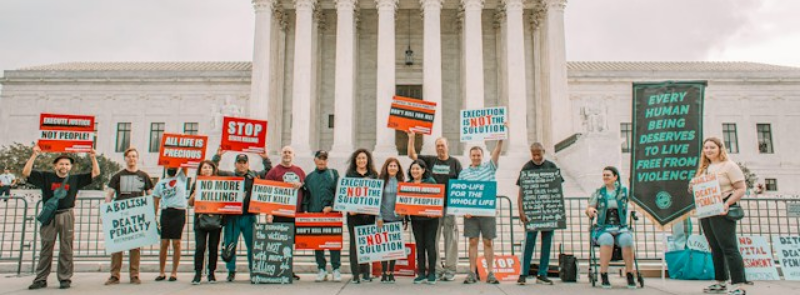
When It Occurs
Every October 10th
Official Website
Timeline
Days Passed (474)
# Hashtags
#WorldDayAgainstTheDeathPenalty #CapitalPunishment
Every year on October 10th, the world comes together to observe the World Day Against the Death Penalty, an initiative established by the World Coalition in 2003. This day serves to shed light on a range of issues associated with capital punishment. Past themes have addressed topics such as poverty, mental health, terrorism, and drug crimes. It serves as a unifying force for the global abolitionist movement, rallying public opinion, legal professionals, civil society, and political leaders to advocate for the universal abolition of the death penalty.
History and Background
- Initiative: The World Day Against the Death Penalty was first organized by the World Coalition Against the Death Penalty, an alliance of NGOs, bar associations, local authorities, and unions formed in Rome in 2002.
- Universal Declaration of Human Rights: Upholds the right to life and dignity, advocating for the abolition of the death penalty.
Objectives and Significance
- Human Rights Advocacy: Promote the abolition of the death penalty as a violation of the right to life and freedom from torture or cruel, inhuman, or degrading treatment or punishment.
- Raise Awareness: Educate the public about the moral, ethical, and legal arguments against the death penalty.
- Support for Victims: Support victims of capital punishment and their families by highlighting their stories and advocating for justice and human rights.
- Legal Reform: Advocate for legal reforms that abolish the death penalty or establish moratoriums on executions.
Themes and Focus Areas
- Human Rights: Emphasize the death penalty's violation of fundamental human rights and its disproportionate impact on marginalized and vulnerable populations.
- Global Perspective: Discuss international perspectives on the death penalty, comparing policies, practices, and public opinion across countries.
- Victims' Voices: Amplify the voices of victims of wrongful convictions, miscarriages of justice, and family members affected by executions.
- Legal and Political Campaigns: Mobilize legal professionals, policymakers, and civil society organizations to advocate for abolition or reform of death penalty laws.
Activities and Campaigns
- Public Awareness Campaigns: Launch educational campaigns, social media initiatives, and public events to inform and engage the public on issues related to the death penalty.
- Panel Discussions and Debates: Host forums, conferences, and debates featuring legal experts, human rights activists, and policymakers discussing the abolitionist movement and challenges.
- Artistic and Cultural Expressions: Organize art exhibitions, film screenings, theater performances, and poetry readings that explore themes of justice, human rights, and abolition.
- Solidarity Events: Participate in rallies, vigils, marches, and demonstrations to show solidarity with individuals on death row and their families.
How to Participate
- Education and Advocacy: Educate yourself and others about the death penalty's implications, share information, and participate in advocacy efforts.
- Support Organizations: Support organizations dedicated to abolitionist causes through donations, volunteering, or participating in their campaigns.
- Raise Awareness: Use social media platforms and personal networks to raise awareness about World Day Against the Death Penalty and its objectives.
- Contact Legislators: Write to policymakers, lawmakers, and government officials urging them to support abolitionist measures or moratoriums on executions.
Global Participation
- International Reach: Observed globally by governments, NGOs, human rights organizations, and activists committed to ending the death penalty.
- Legal and Policy Reform: Promotes international cooperation and advocacy for legal and policy reforms that align with human rights standards and abolitionist principles.
- Public Opinion and Debate: Engages the public in discussions about justice, human rights, and the ethical considerations surrounding capital punishment.
Resources and Support
- World Coalition Against the Death Penalty: Provides resources, toolkits, and campaign materials for individuals and organizations participating in World Day Against the Death Penalty.
- Human Rights Organizations: Offers information, reports, and advocacy tools focused on the death penalty's impact on human rights and justice systems globally.
- Legal Assistance Programs: Supports efforts to provide legal assistance to individuals facing the death penalty and advocate for fair trials and due process rights.
Notable Observations and Examples
- Success Stories: Highlights successful abolitionist campaigns, legal victories, and policy reforms that have led to the abolition or reduction of the death penalty in various countries.
- Case Studies: Profiles individuals who have been exonerated from death row or whose cases have sparked international outcry and activism against the death penalty.
- Global Solidarity: Demonstrates international solidarity through joint statements, resolutions, and actions by governments, NGOs, and human rights defenders.
Key Messages
- Human Dignity: Uphold the inherent dignity and worth of every human being by advocating for the abolition of the death penalty.
- Justice and Fairness: Advocate for justice, fairness, and due process rights in legal systems to prevent wrongful convictions and miscarriages of justice.
- Social Change: Work towards social change and policy reform that aligns with human rights principles and promotes alternatives to capital punishment.
- Global Movement: Participate in a global movement of solidarity and action to end the death penalty and promote human rights worldwide.
World Day Against the Death Penalty serves as a platform for raising awareness, advocating for human rights, and mobilizing global efforts towards the abolition of capital punishment in all its forms.


